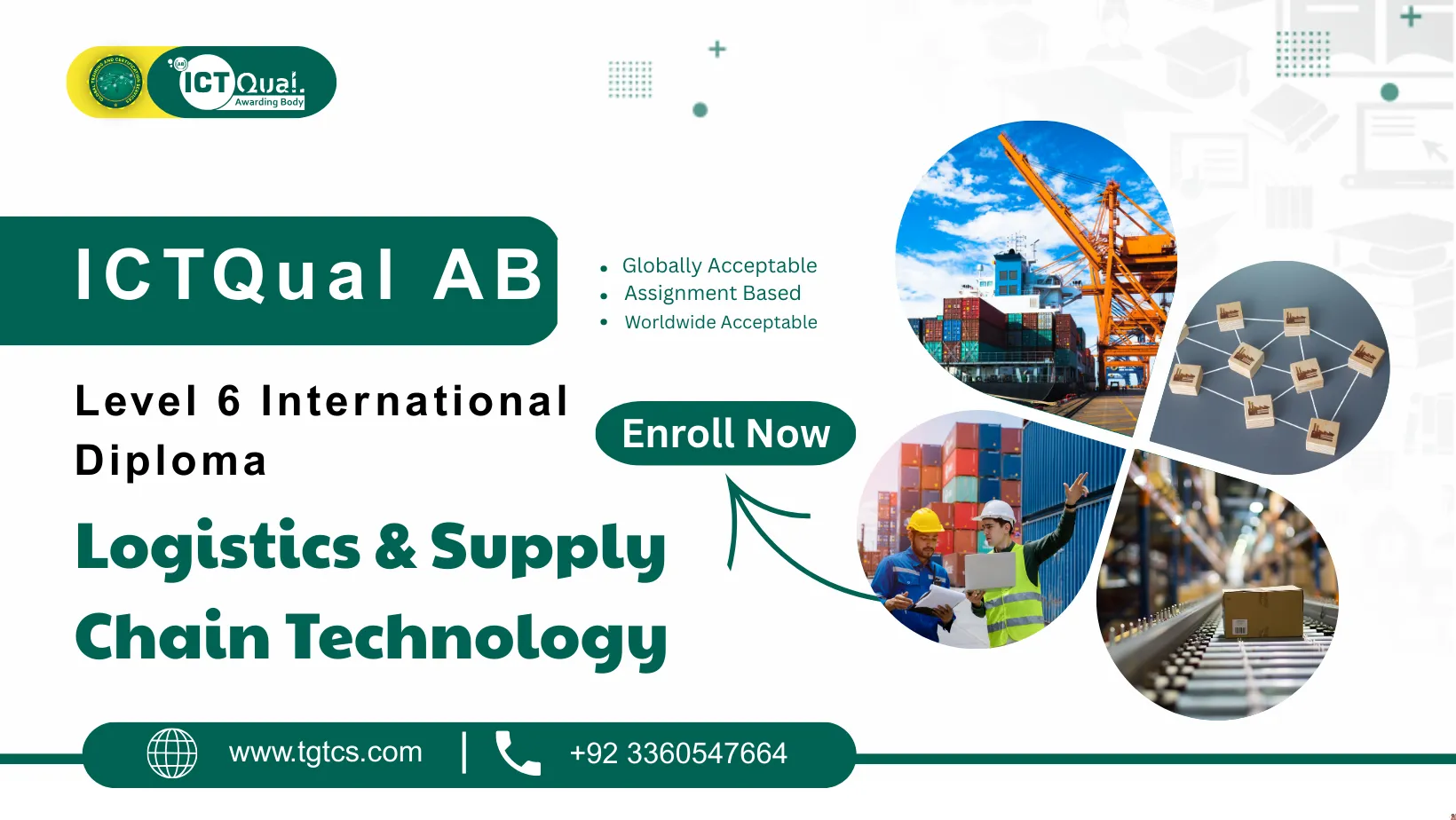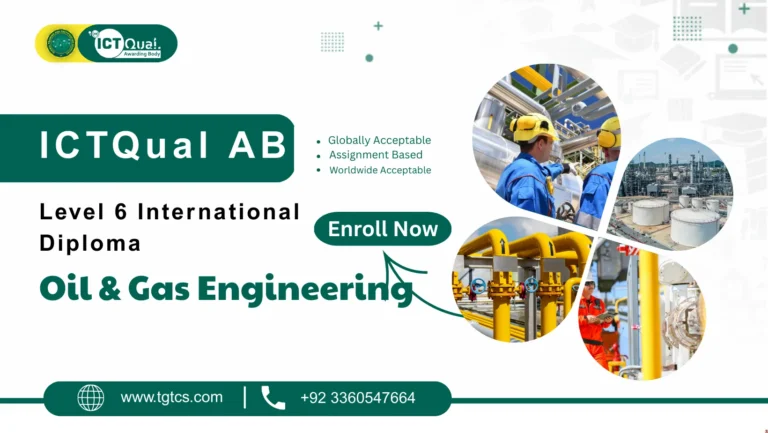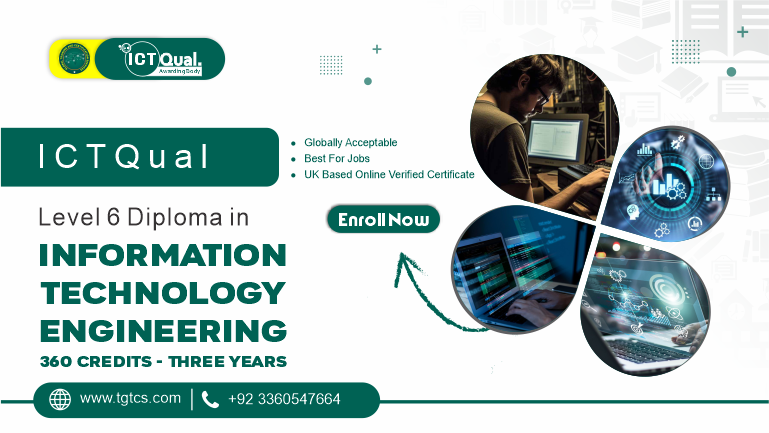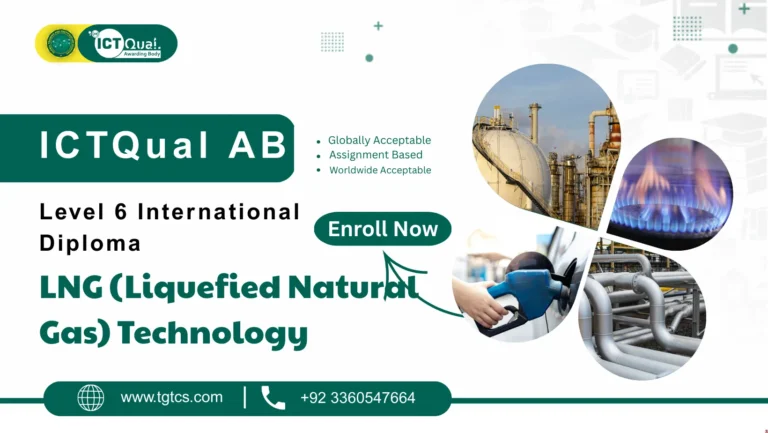ICTQual AB Level 6 International Diploma in Logistics & Supply Chain Technology
The ICTQual AB Level 6 International Diploma in Logistics & Supply Chain Technology equips learners with advanced knowledge, practical skills, and strategic expertise to excel in logistics, supply chain operations, and global trade management.
This program is designed for professionals, logistics managers, supply chain analysts, operations planners, and students aspiring to leadership roles in logistics and supply chain management. Learners will gain comprehensive insights into inventory management, procurement strategies, transportation planning, warehouse operations, demand forecasting, global supply chain integration, and digital logistics technologies, providing a holistic understanding of modern supply chain networks.
The course emphasizes real-world applications alongside theoretical frameworks, enabling learners to implement efficient logistics strategies, optimize supply chain operations, and enhance organizational performance. Through case studies, simulations, and project-based learning, participants develop competencies in strategic supply chain planning, risk management, lean logistics, sustainable supply chain practices, and advanced operational analytics.
Graduates of this diploma emerge as highly competent professionals capable of leading complex supply chain operations, optimizing logistics processes, and driving innovation and sustainability in global business networks. They will be prepared to make informed strategic decisions, improve operational efficiency, and manage supply chain challenges in diverse industries worldwide.
The Global Training and Certification Services is Approved Training Centre of ICTQual AB UK Ltd
Course Level and Credits
Level 6 International Diploma, 360 credits.
Suitable for professionals, supply chain managers, logistics specialists, and students seeking advanced knowledge in logistics and supply chain technology.
Mode of Study
Fully assignment-based; learn at your own pace.
Accessible from anywhere in the world, flexible for working professionals and career changers.
Global Recognition & Attestation
British Council verifiable, MOFA and Embassy attested.
Recognized for career advancement, employment, and professional credibility in global supply chain and logistics sectors.
Scope and Purpose
Comprehensive coverage of logistics operations, supply chain planning, procurement, transportation management, warehouse operations, demand forecasting, and digital supply chain technologies.
Focus on both theoretical understanding and practical application in real-world logistics and supply chain scenarios.
Skills and Knowledge Gained
Inventory management, transportation planning, warehouse optimization, procurement strategies, and global supply chain integration.
Leadership, strategic decision-making, risk management, and sustainable supply chain practices for multinational business environments.
Career Benefits
Opens opportunities in logistics companies, supply chain management firms, procurement agencies, warehousing organizations, and global trade operations.
Enhances professional credibility, employability, and global recognition in logistics and supply chain management.
Target Audience
Professionals, logistics managers, supply chain analysts, and students aiming for careers in logistics, supply chain management, and operational excellence.
Unique Selling Points (USPs)
Flexible self-paced study, fully assignment-based.
Prestigious and globally recognized Level 6 diploma.
Ideal for leadership roles, international career advancement, and professional credibility in logistics and supply chain sectors.
Mandatory Unit
This qualification, the ICTQual AB Level 6 International Diploma in Logistics & Supply Chain Technology, consists of 36 mandatory units.
Year 1 – Foundations of Logistics & Supply Chain
- Introduction to Logistics and Supply Chain Management
- Principles of Transport and Distribution
- Inventory Management and Control Systems
- Procurement and Supplier Management
- Basics of Warehouse Operations
- Supply Chain Economics and Policy
- Fundamentals of Risk Management in Logistics
- Business Communication and Professional Ethics
- Introduction to Global Trade and Regulations
- Sustainability and Environmental Management in Supply Chains
- Information Systems in Logistics
- Introduction to Project Management
Year 2 – Applied Logistics Operations & Management
- Advanced Supply Chain Planning and Scheduling
- Freight and Transportation Management
- Procurement Strategy and Supplier Evaluation
- Warehouse and Inventory Optimisation Techniques
- Logistics Technology and Digitalisation
- Safety, Compliance, and Risk Mitigation in Operations
- Logistics Performance Measurement and KPIs
- Lean and Six Sigma Applications in Supply Chains
- Global Logistics and International Trade Management
- Human Resource and Team Management in Logistics
- Applied Case Studies in Supply Chain Management
- Simulation Exercises in Logistics Operations
Year 3 – Strategic Leadership & Advanced Supply Chain Management
- Strategic Supply Chain Management
- Leadership and Decision-Making in Logistics
- Advanced Procurement and Contract Management
- Global Supply Chain Integration and Coordination
- Transport Network Design and Optimisation
- Risk Management and Crisis Response in Supply Chains
- Sustainability, Circular Economy, and Green Logistics
- Emerging Technologies and Innovation in Supply Chains
- Data Analysis and Research Methods for Logistics
- Independent Research Project in Logistics & Supply Chain
- Capstone Project: Applied Strategic Supply Chain Management
- Performance Audit and Continuous Improvement Strategies
The ICTQual AB Level 6 International Diploma in Logistics & Supply Chain Technology is designed to equip learners with advanced knowledge, practical skills, and strategic expertise in global logistics, supply chain operations, procurement, inventory management, transportation planning, and warehouse optimization.
Year 1 – Foundations of Logistics & Supply Chain
Introduction to Logistics and Supply Chain Management
- Understand the fundamentals of logistics and supply chain operations
- Explore roles, functions, and trends in global supply chains
- Analyze operational challenges and opportunities in logistics networks
- Develop a foundational understanding of strategic supply chain management
Principles of Transport and Distribution
- Learn key concepts of transport operations and distribution strategies
- Understand route planning, fleet management, and multimodal transport
- Apply distribution principles to optimize delivery efficiency
- Evaluate transport operations for cost-effectiveness and reliability
Inventory Management and Control Systems
- Understand inventory types, control techniques, and stock management
- Apply inventory optimization methods to reduce costs and improve efficiency
- Monitor stock levels and implement replenishment strategies
- Evaluate inventory performance using key metrics and KPIs
Procurement and Supplier Management
- Understand supplier selection, evaluation, and relationship management
- Apply procurement strategies to enhance supply chain performance
- Evaluate supplier contracts and compliance with operational standards
- Develop negotiation and collaboration skills for effective supplier partnerships
Basics of Warehouse Operations
- Understand warehouse layout, storage systems, and material handling
- Apply operational processes to improve workflow and efficiency
- Implement basic warehouse safety and inventory control measures
- Evaluate warehouse performance and optimize operational effectiveness
Supply Chain Economics and Policy
- Analyze economic principles affecting supply chains and logistics
- Understand policy frameworks, regulations, and trade agreements
- Apply economic analysis to operational and strategic planning
- Assess the impact of policies on supply chain efficiency and sustainability
Fundamentals of Risk Management in Logistics
- Identify and assess risks in logistics and supply chain operations
- Develop mitigation strategies and contingency plans
- Apply risk management tools to operational decision-making
- Monitor and evaluate risk controls for continuous improvement
Business Communication and Professional Ethics
- Develop effective communication and negotiation skills in logistics contexts
- Understand ethical standards and corporate responsibility in supply chains
- Apply professional reporting and documentation techniques
- Promote collaboration and ethical practices across supply chain networks
Introduction to Global Trade and Regulations
- Understand international trade concepts, regulations, and compliance requirements
- Apply trade documentation and customs procedures in logistics operations
- Evaluate global trade policies and their impact on supply chain performance
- Develop knowledge of cross-border transport and regulatory frameworks
Sustainability and Environmental Management in Supply Chains
- Understand environmental challenges and sustainability in logistics
- Implement eco-friendly practices and monitor environmental performance
- Apply green logistics strategies to reduce emissions and waste
- Evaluate sustainability initiatives for operational and strategic impact
Information Systems in Logistics
- Understand digital tools and software for supply chain management
- Apply logistics information systems for inventory, transport, and warehouse management
- Analyze data to improve operational efficiency and decision-making
- Monitor system performance and integrate digital solutions for optimization
Introduction to Project Management
- Understand principles of project planning, execution, and monitoring
- Apply project management techniques to logistics and supply chain operations
- Manage resources, schedules, and budgets effectively
- Evaluate project outcomes and implement continuous improvement strategies
Year 2 – Applied Logistics Operations & Management
Advanced Supply Chain Planning and Scheduling
- Plan, coordinate, and optimize complex supply chain operations
- Apply forecasting and scheduling tools for operational efficiency
- Monitor and evaluate supply chain performance
- Implement strategies to reduce costs and improve service levels
Freight and Transportation Management
- Manage freight and transportation operations for efficiency and reliability
- Apply multimodal transport strategies to optimize logistics networks
- Monitor delivery performance and compliance with safety standards
- Evaluate operational data to enhance transport efficiency
Procurement Strategy and Supplier Evaluation
- Develop procurement strategies aligned with business objectives
- Evaluate supplier performance, quality, and reliability
- Apply strategic sourcing techniques to improve cost-effectiveness
- Monitor supplier compliance and optimize procurement processes
Warehouse and Inventory Optimisation Techniques
- Apply lean principles and inventory optimization strategies
- Manage warehouse layout, storage systems, and material flow
- Monitor inventory performance using KPIs and analytics
- Implement process improvements to enhance operational efficiency
Logistics Technology and Digitalisation
- Use digital tools, IoT, and automation to optimize supply chain operations
- Apply technology for inventory, transport, and warehouse management
- Analyze data for decision-making and operational performance improvement
- Monitor digital systems to ensure reliability and integration
Safety, Compliance, and Risk Mitigation in Operations
- Implement safety protocols and compliance measures in logistics operations
- Develop risk mitigation strategies for operational and strategic challenges
- Monitor safety performance and evaluate effectiveness of controls
- Promote a culture of safety and regulatory adherence
Logistics Performance Measurement and KPIs
- Identify key performance indicators for logistics and supply chain operations
- Apply measurement tools to assess operational efficiency
- Analyze performance data to optimize processes
- Develop strategies for continuous improvement in supply chain operations
Lean and Six Sigma Applications in Supply Chains
- Apply lean and Six Sigma methodologies to optimize supply chain processes
- Reduce waste, improve quality, and increase operational efficiency
- Analyze process data to identify improvement opportunities
- Implement continuous improvement strategies for logistics operations
Global Logistics and International Trade Management
- Understand global supply chain networks and international trade dynamics
- Apply trade compliance, customs procedures, and cross-border logistics strategies
- Optimize international transport and distribution operations
- Evaluate global supply chain performance and risk management
Human Resource and Team Management in Logistics
- Manage teams and human resources in supply chain and logistics operations
- Apply leadership and motivational strategies for workforce productivity
- Implement training, development, and performance evaluation programs
- Ensure compliance with labor laws and workplace safety standards
Applied Case Studies in Supply Chain Management
- Analyze real-world logistics and supply chain challenges
- Apply theoretical knowledge to practical problem-solving
- Evaluate outcomes and recommend process improvements
- Develop critical thinking and operational decision-making skills
Simulation Exercises in Logistics Operations
- Conduct practical simulations of supply chain and logistics scenarios
- Apply planning, scheduling, and operational strategies in controlled settings
- Evaluate performance, identify bottlenecks, and optimize processes
- Build problem-solving and decision-making skills in logistics management
Year 3 – Strategic Leadership & Advanced Supply Chain Management
Strategic Supply Chain Management
- Develop long-term supply chain strategies for competitive advantage
- Align logistics operations with organizational goals and market trends
- Apply strategic planning tools to optimize supply chain performance
- Monitor and evaluate outcomes for continuous improvement
Leadership and Decision-Making in Logistics
- Strengthen leadership and strategic decision-making skills in supply chain contexts
- Lead multidisciplinary teams to achieve operational and strategic objectives
- Implement effective communication and problem-solving strategies
- Evaluate leadership effectiveness and organizational performance
Advanced Procurement and Contract Management
- Manage complex procurement processes and supplier contracts
- Apply negotiation, compliance, and risk management strategies
- Monitor supplier performance and contractual obligations
- Implement procurement best practices for efficiency and cost savings
Global Supply Chain Integration and Coordination
- Integrate operations across international supply chains for seamless flow
- Apply coordination strategies for inventory, transport, and production
- Monitor global logistics performance and optimize cross-border processes
- Develop strategies for supply chain resilience and responsiveness
Transport Network Design and Optimisation
- Plan and optimize transport networks for efficiency and cost-effectiveness
- Apply route planning, modal selection, and capacity management techniques
- Evaluate network performance and implement improvements
- Use technology to enhance transport network reliability and sustainability
Risk Management and Crisis Response in Supply Chains
- Identify and mitigate risks in global supply chains
- Develop crisis management and business continuity strategies
- Apply risk assessment tools to operational and strategic planning
- Monitor and evaluate risk mitigation effectiveness
Sustainability, Circular Economy, and Green Logistics
- Implement sustainable logistics and supply chain practices
- Apply circular economy principles to reduce waste and improve efficiency
- Monitor environmental impact and develop green logistics strategies
- Promote sustainability in operational and strategic decision-making
Emerging Technologies and Innovation in Supply Chains
- Explore AI, IoT, blockchain, and digital platforms in supply chain management
- Apply innovative technologies to optimize operations and reduce costs
- Integrate emerging solutions into strategic planning and decision-making
- Evaluate technological impact on supply chain efficiency and competitiveness
Data Analysis and Research Methods for Logistics
- Conduct quantitative and qualitative research in logistics and supply chains
- Apply data analytics for operational and strategic decision-making
- Develop research reports and insights for management and stakeholders
- Evaluate research outcomes to support continuous improvement
Independent Research Project in Logistics & Supply Chain
- Conduct in-depth research on a specialized logistics or supply chain topic
- Apply analytical, planning, and project management skills
- Develop practical recommendations based on evidence and findings
- Demonstrate professional competence, critical thinking, and problem-solving
Capstone Project: Applied Strategic Supply Chain Management
- Integrate knowledge and skills from all course units into a comprehensive project
- Design and implement strategic solutions for complex supply chain challenges
- Analyze outcomes, measure performance, and recommend improvements
- Showcase leadership, operational, and strategic management expertise
Performance Audit and Continuous Improvement Strategies
- Conduct performance audits of logistics and supply chain operations
- Identify inefficiencies, bottlenecks, and areas for improvement
- Apply continuous improvement methodologies for operational excellence
- Develop actionable strategies to optimize supply chain performance
The ICTQual AB Level 6 International Diploma in Logistics & Supply Chain Technology empowers learners to master global logistics and supply chain operations, strategic management, and operational efficiency, preparing them for leadership roles in diverse industries.
Enhanced Career Opportunities
- Unlock leadership roles in logistics companies, supply chain management firms, procurement departments, and global trade organizations
- Improve employability and professional credibility with a prestigious Level 6 international diploma
Practical Skills Development
- Gain hands-on expertise in inventory management, warehouse operations, transportation planning, procurement, and digital supply chain technologies
- Develop operational and strategic decision-making skills for optimizing logistics and supply chain performance
Strategic and Analytical Competence
- Learn to analyze supply chain networks, performance metrics, and economic trends for better decision-making
- Implement risk management, lean logistics, and continuous improvement strategies for operational excellence
Global Recognition and Compliance Knowledge
- Understand international trade regulations, compliance standards, and sustainability requirements
- Apply regulatory and policy knowledge to ensure safe, ethical, and efficient supply chain operations
Innovation and Sustainable Practices
- Leverage emerging technologies, data analytics, and digital tools for modern supply chain management
- Implement sustainable logistics strategies, circular economy principles, and green supply chain practices
This diploma prepares learners to become strategic leaders in logistics and supply chain management, capable of driving operational efficiency, innovation, and sustainability in global business environments.
The ICTQual AB Level 6 International Diploma in Logistics & Supply Chain Technology is designed for learners aiming to advance their careers in global logistics, supply chain management, procurement, and operational leadership.
Logistics and Supply Chain Professionals
- Enhance expertise in transport, warehouse, inventory, and management
- Gain skills to optimize supply chain operations and improve organizational efficiency
Career Changers in Supply Chain and Operations
- Transition into logistics and supply chain management roles with practical knowledge
- Acquire competencies in digital logistics, risk management, and operational planning
Organizational Leaders and Managers
- Strengthen leadership and decision-making skills for supply chain and logistics teams
- Develop strategies for optimizing performance, ensuring compliance, and achieving business goals
Procurement and Inventory Specialists
- Gain advanced knowledge of procurement strategies, supplier management, and contract compliance
- Optimize inventory, warehousing, and stock control for operational excellence
Researchers and Academics in Supply Chain
- Conduct applied research and data analysis in logistics and supply chain projects
- Develop innovative solutions for sustainable, efficient, and technology-driven supply chains
This course prepares learners to become strategic professionals and leaders capable of managing complex logistics networks, implementing sustainable practices, and driving operational excellence in global supply chain environments.
Course Overview
Course Level
Level 6
Course Units
36 Units
Credits
360
Duration
3 years






